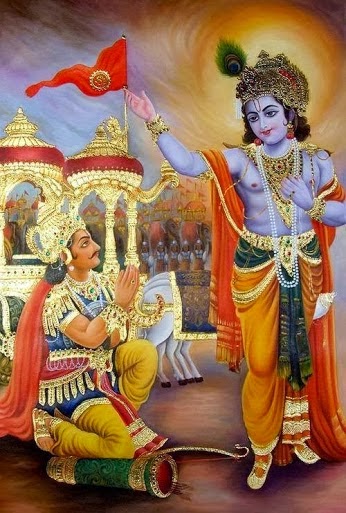Gita : Ch-4. Slo-41.
Srimad Bhagavad-Gita :
Chapter-4. ( Jnana-karma-sanyasa-yogam )
Slokam- 41. ( Therefore, one who has renounced the fruits of his action, whose doubts are destroyed by transcendental knowledge, and who is situated firmly in the self, is not bound by karma O Arjuna. )
Yogasannyastakarmanam jnanasanchinnasamsayam
atmavantam na karmani nibadhnanti dhananjaya.
dhananjaya = O Arjuna;
yoga-sannyasta-karmanam = renounced karma with the help of karma-yoga ( renunciation of fruits of his karma );
jnana-sanchinna-samsayam = doubts are destroyed ( cleared ), with the help of Jnanam ( advancement of knowledge );
atmavantam = completely established in the Self ( Atmam );
karmani na nibadhnanti = is not bound by karma ( actions ).
Lord Krishna explains that the performance of karma yoga or prescribed Vedic activities is the mode of action in the ways He indicated above. Dedication and renunciation means that actions are performed in jnana yoga or the cultivation of Vedic knowledge. When performed in this way the binding power of actions becomes neutralised. Also by this method any doubts concerning the atma or soul are dispelled by knowledge of the atma. The compound word atma-vantam means one who is self-satisfied. One whose mind is unassailable and unapproachable by any type of doubt. Such a person has achieved an unshakeable certitude about the reality and eternality of the soul from the teachings received from the spiritual master. No actions performed for oneself or for others in the present or the future can ever bind such a person.
The dual method of realising the Brahman or the spiritual substratum pervading all existence has been taught with karma yoga or the performance as prescribed Vedic activities as the beginning stage and jnana yoga or the cultivation of Vedic knowledge as the intermediate stage in the last two chapters, is being concluded with this slokam. One who has offered all actions to the Supreme Lord has renounced actions. This yoga or the science of the individual consciousness attaining communion with the ultimate consciousness is performed continuously. Therefore all doubts in regard to ego-consciousness have been destroyed by the fire of knowledge knowing that one is not the physical body. One is consciousness and self alert and is not bound by actions whether they are naturally done for oneself or for others.
In this way the complete failure of the ignorant who doubt the veracity of the spiritual well-wishers has been given in order to remove all doubts of the aspirant for moksa or liberation who has faith follows a life of pious conduct. The dual paths of karma yoga or prescribed Vedic activities and jnana yoga or cultivation of Vedic knowledge are both concluded in this slokam and the next. Actions do not bind one to material existence who is renounced. All actions offered or dedicated to the Supreme Lord are always renounced. This is characterised by direct perception of the Supreme Lord and the conscious reality that one belongs exclusively to Him which arises only after the realisation of the Brahman or the spiritual substratum pervading all existence is perceived.
To be continued ..





Comments
Post a Comment